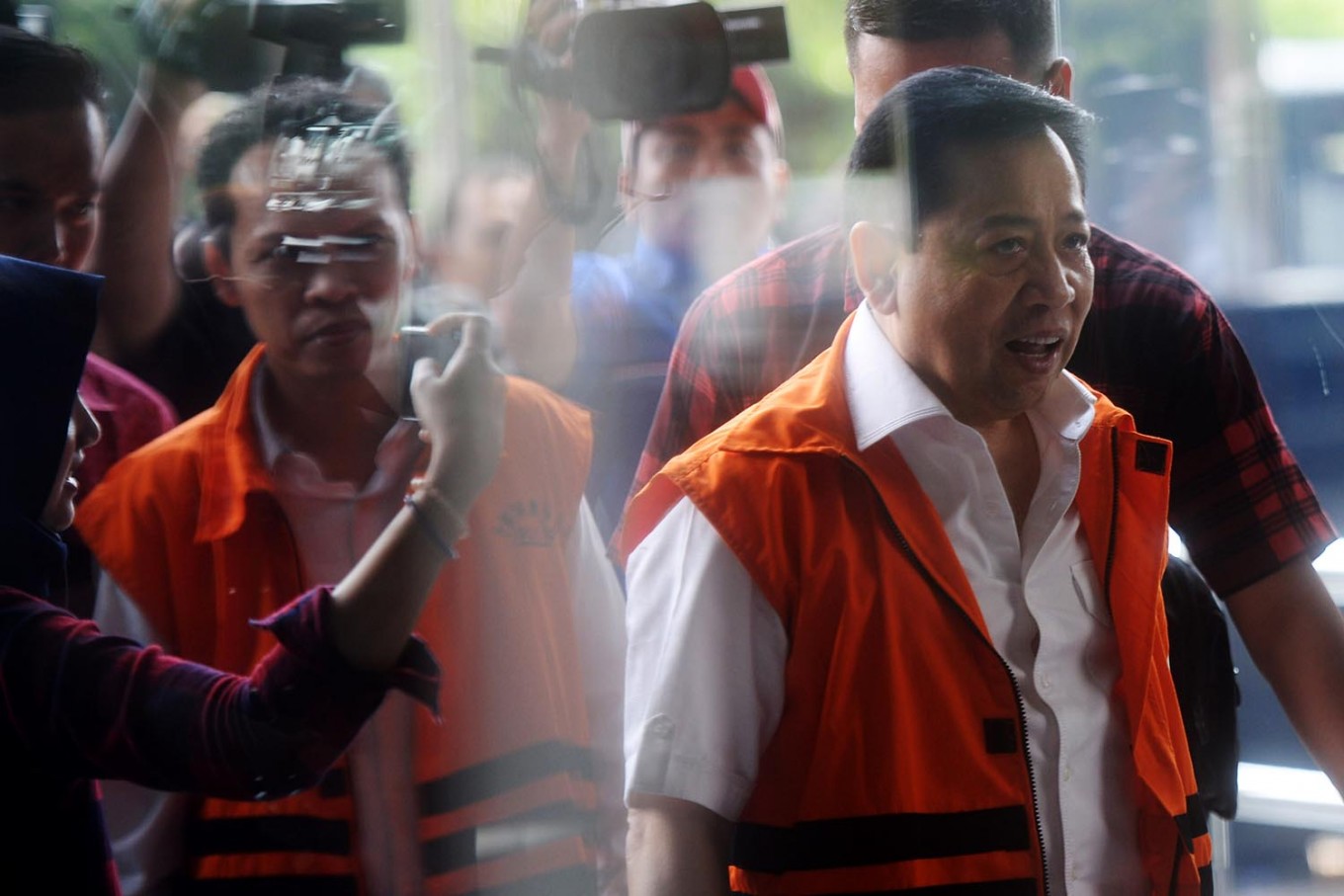Popular Reads
Top Results
Can't find what you're looking for?
View all search resultsPopular Reads
Top Results
Can't find what you're looking for?
View all search resultsActivists slam Yasonna’s plan to release graft convicts over fears of COVID-19 spread
Indonesia Corruption Watch (ICW) activist Kurnia Ramadhana said among the major graft convicts who would be eligible for early release were Setya Novanto, 64, former Constitutional Court judge Patrialis Akbar, 61, former health minister Siti Fadilah, 70, former religious affairs minister Suryadharma Ali, 63, and lawyer OC Kaligis, 78.
Change text size
Gift Premium Articles
to Anyone
 Former House of Representatives speaker Setya Novanto (right) arrives at the Corruption Eradication Commission (KPK) building in Jakarta for questioning in the e-ID graft case on Sept. 4, 2018. Anticorruption activists have criticized Law and Human Rights Minister Yasonna Laoly’s plan to curb COVID-19 transmission in overcrowded prisons by revising correctional regulations and releasing 50,000 inmates early, including graft inmates. (Antara/Akbar Nugroho Gumay)
Former House of Representatives speaker Setya Novanto (right) arrives at the Corruption Eradication Commission (KPK) building in Jakarta for questioning in the e-ID graft case on Sept. 4, 2018. Anticorruption activists have criticized Law and Human Rights Minister Yasonna Laoly’s plan to curb COVID-19 transmission in overcrowded prisons by revising correctional regulations and releasing 50,000 inmates early, including graft inmates. (Antara/Akbar Nugroho Gumay)
A
nticorruption activists have criticized Law and Human Rights Minister Yasonna Laoly’s plan to curb COVID-19 transmission in overcrowded prisons by revising correctional regulations and releasing 50,000 inmates early, including graft inmates.
Through Human Rights Ministerial Regulation No.10/2020 and Human Rights Ministerial Decree No.19/2020, Yasonna plans to change terms and conditions for prisoners and juvenile inmates’ that were initially regulated in Government Regulation No. 99/2012.
If approved, the regulations would release 300 graft convicts aged 60 years and above currently serving their sentences in addition to 15,442 drug convicts who have served five to 10 years, 1,457 special crime convicts with chronic diseases and 53 foreign prisoners who have served two-thirds of their sentences.
The ministry has so far released some 5,500 inmates to reduce prison overcrowding.
Anticorruption activists condemned the decision as the regulation would result in the release of people convicted in major corruption cases, including Setya Novanto who was sentenced to 16 years for rigging the Rp 5.9 trillion (US$424 million) e-ID project, which reportedly caused Rp 2.3 trillion in state losses.
Setya is not due for release until 2034, but the proposed regulation would release him early as he is 64 years old.
Read also: Overcrowded and understaffed, prisons scramble to protect inmates from infection
Indonesia Corruption Watch (ICW) activist Kurnia Ramadhana said other major graft convicts that would be eligible for early release included former Constitutional Court judge Patrialis Akbar, 61, former health minister Siti Fadilah, 70, former religious affairs minister Suryadharma Ali, 63, and lawyer OC Kaligis, 78.
Kurnia said that releasing corruption convicts would not be effective in reducing prison capacity as they only made up a small minority of inmates.
“Law and Human Rights Ministry data in 2018 showed that Indonesia had 248,690 prisoners, of which graft convicts only made up 1.8 percent with 4,552,” Kurnia said in a virtual press conference on Thursday.
Indonesian Legal Aid Foundation (YLBHI) activist Muhammad Isnur said that by releasing corruption convicts early, the minister had relegated the status of corruption from an extraordinary to a mere ordinary crime.
Another ICW activist, Donal Fariz, said that Yasonna was taking advantage of the crisis to try and free graft convicts, adding that the move was another blow by the government to the anticorruption battle after weakening the Corruption Eradication Commission (KPK) through a recent law that stripped most of its powers and the appointment of controversial new leaders.









